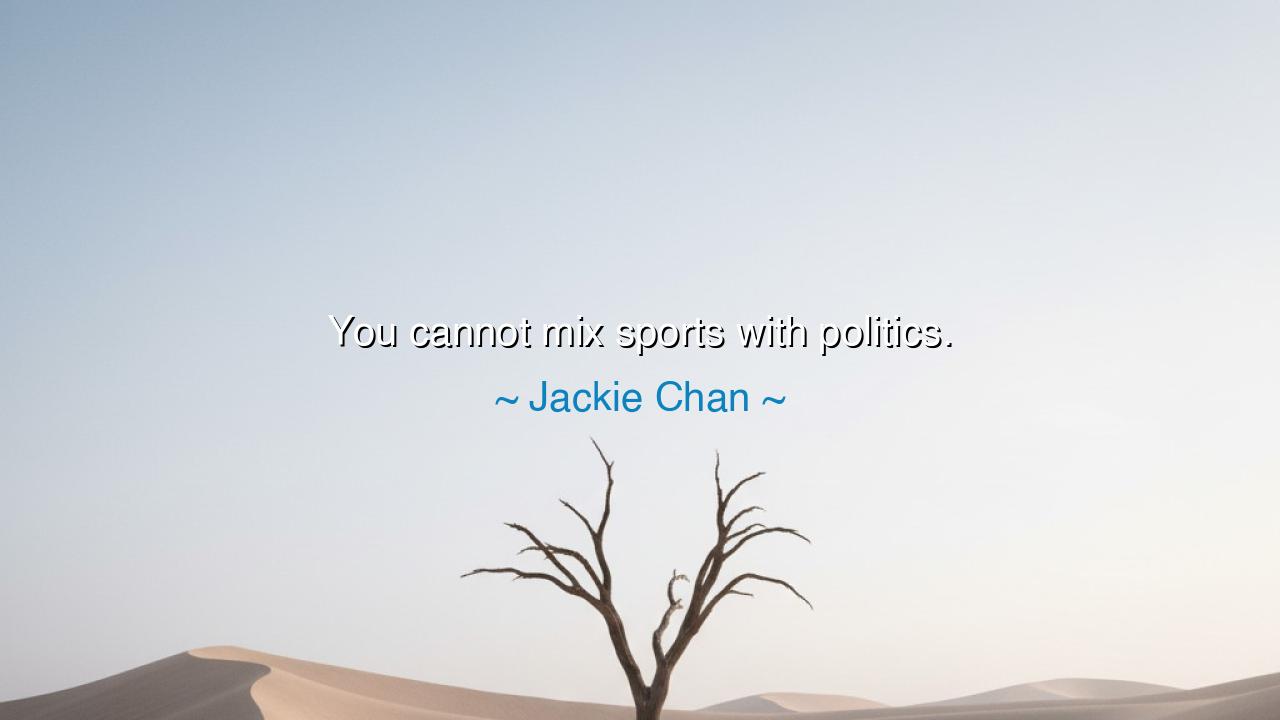
You cannot mix sports with politics.






The words of Jackie Chan, “You cannot mix sports with politics,” carry with them the yearning for purity, for the sacred ground of competition to remain untouched by the storms of division and ideology. In these few words, Chan reminds us that sports, in their essence, are meant to unite, to test strength and spirit on equal footing, to bring people together in the universal language of striving and play. When politics enters, the purity is clouded, and the field of honor becomes a battlefield of power. His statement is not naïve, but rather the voice of one who has seen how easily the joy of the game can be lost when it becomes an instrument of division.
The origin of this thought rests in the long history of both sport and politics, which have often collided. Chan, a man who built his life upon art, cinema, and discipline, recognized that sport—like martial arts—was designed not as a tool for propaganda but as a way to discipline the self and build harmony. To “mix” sport with politics is, in his view, to corrupt its higher purpose. For the contest between athletes should be free of the quarrels of rulers, the policies of nations, and the rivalries of ideology.
History, however, shows us how difficult this separation has been. Consider the Olympic Games of ancient Greece. They were meant to be sacred, a time of truce when wars paused so that men could compete in honor before the gods. And yet, even there, politics seeped in: city-states used victories to boast of superiority, and rulers often claimed the glory of their athletes as their own. The lesson is clear—though sport aspires to purity, men are ever tempted to chain it to their ambitions.
In the modern age, the same struggle is evident. When Jesse Owens triumphed in the 1936 Berlin Olympics, he did so in defiance of Hitler’s twisted vision of racial superiority. His four gold medals became not only an athletic triumph but also a political symbol. Owens himself wished only to run, yet history made his victory a weapon against oppression. Chan’s quote, then, can be heard as a lament: that even when athletes strive purely, the world may use their achievements for its own battles.
The lesson here is profound. Though sport and politics often meet, we must strive to protect the spirit of the game. Sport, at its heart, is not about power but about human excellence, not about nations clashing but about individuals striving. If we allow politics to rule the field, then we lose the joy of sport as a bridge between peoples. But if we protect its purity, we allow it to become what it was meant to be: a meeting place of humanity where differences fade, and unity shines.
Practically, this means approaching sports as more than tribal contests. Cheer for your nation, yes, but honor also the excellence of your rivals. Celebrate not only victory but the courage to compete. Refuse to let political arguments poison the joy of watching human beings reach the limits of their potential. And for leaders, it means restraining the urge to wield sport as a weapon of propaganda, and instead letting it stand as a symbol of what unites rather than divides.
So, beloved listener, let Jackie Chan’s words echo in your heart: “You cannot mix sports with politics.” Though history shows us that such mixing has often happened, his plea is a call to higher wisdom—to keep sacred the field of play, to protect its innocence, to let it be a beacon of peace in a world too often torn by conflict. For when athletes meet not as pawns of rulers but as brothers and sisters in struggle, then the game becomes more than a game—it becomes a vision of the world as it could be, free of division, and full of shared humanity.






AAdministratorAdministrator
Welcome, honored guests. Please leave a comment, we will respond soon